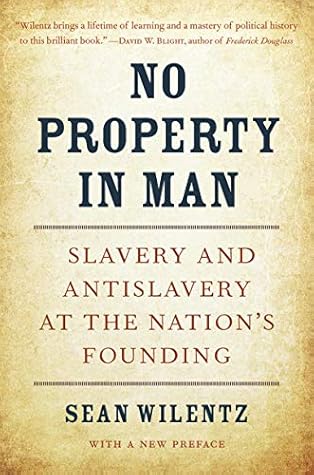More on this book
Kindle Notes & Highlights
by
Sean Wilentz
Read between
November 15 - December 3, 2021
the general view inside the convention that, as James Madison remarked, “the primary objects of civil society are the security of property and public safety.”6 Because
Rufus King of Massachusetts, for one, said that he “had always expected that as the Southern States are the richest, they would not league themselves with the Northrn unless some respect were paid to their superior wealth,” which meant in considerable part their wealth in slaves.8 How much respect, though, would the delegates pay to property in humans, as created and regulated by state laws?
New Englanders, however, more than others, regarded the slightest connection to slavery as intolerable, and overlooked entirely the Constitution’s exclusion of property in man. “I must confess it will be very wonderful to me, if the Massachusettensians (above all people in the world) should hold up their hands to give efficacy to a constitution which admits of slavery,” the writer “Adelos” observed.10 “If we cannot connect with the southern states without giving countenance to blood and carnage, and all kinds of fraud and injustice,” “Phileleutheros” declared, “I say let them go.”11 For these
...more
Echoing Puritan as well as Quaker precepts, many antislavery New England critics based their dissent on the heavy burden of collective sin, in accordance with what one Massachusetts writer called the “doctrine of imputed guilt in civil society.”12 Addressing the New Hampshire ratification convention, the ex-Loyalist antislavery Anti-Federalist Joshua Atherton reduced the antislavery argument to a simple proposition: “If we ratify the constitution,” then “we become consenters to and partakers in the sin and guilt.”13 The slave trade, in particular, had “become a national sin, and a sin of the
...more
New England Federalists, for their part, dismissed the opposition’s maledictions about imputed guilt. “The idea that by civil connections, we become partakers of each others sins, I believe is of late date,” the Massachusetts Federalist “Philanthrop” contended.22 The distinguished revolutionary general William Heath, addressing the Massachusetts convention, seized upon the federal nature of the Constitution and its insistent rendering of slavery as a local institution, not a national one. “Each State is sovereign and independent to a certain degree, and they have a right, and will regulate
...more
Is this not appropriate now!! Virtue Signaling. Only people like Garrison (extreme abolitionist) are good.
States is incomparably preferable to the old one … and must therefore meet the wishes and derive the support of every friend to humanity, and the common rights of mankind.”24 The eminent Baptist leader Rev. Isaac Backus, an antislavery stalwart, made the same point in a pro-ratification speech to the Massachusetts convention, rejoicing that “a door is now opened” to end the importation of Africans—the latest sign, he said, that “slavery grows more and more odious through the world.”25 In Providence, a group of free blacks gathered on the Fourth of July to celebrate “the Prospect of a Stop
...more
Samuel Hopkins, whose fear of anarchy finally led him to support ratification despite his chagrin over slavery, remarked that nothing remained but to rely on the Supreme Ruler to one day “vindicate the oppressed, and break the arm of the oppressor in his own way and time.”30
But there also remained a conviction that whatever its merits, the Constitution had intolerably created a new nation partly in order to make that nation safe for slavery.
Others held fast to William Rotch’s opinion that framers founded the new nation, pure and simple, on slavery and blood. Such certitude allowed little room for finding antislavery meanings inside the Constitution, whether about property in man or anything
Antislavery northerners rebutted these proslavery arguments point by point. “Slavery, sir, I repeat, is not established by our Constitution,” Arthur Livermore proclaimed at the outset of the struggle.101 The anti-restriction argument, Daniel Cook of Illinois observed, rested on the fallacy that “the right to hold slaves is guarantied by the Federal Constitution” and was thus immune to congressional interference. Slavery, Cook said, existed before the Constitution was framed, and the Federal Convention, in order to secure the Union, merely “provided against the invasion of that right in such of
...more
This highlight has been truncated due to consecutive passage length restrictions.
The antislavery Vermont Republican Charles Rich delivered a full refutation of the slaveholders, and with it a summation of an emerging antislavery constitutionalism.104 Although it pained him to oppose his longtime southern Republican allies, Rich said, he found it impossible to square the first principles of either the Declaration of Independence or the preamble of the Constitution with slavery. Although slavery existed at the nation’s founding, this misfortune hardly necessitated slavery’s continued existence. “By what charter of a national character,” he asked, “[has] a right to hold a
...more
This highlight has been truncated due to consecutive passage length restrictions.


